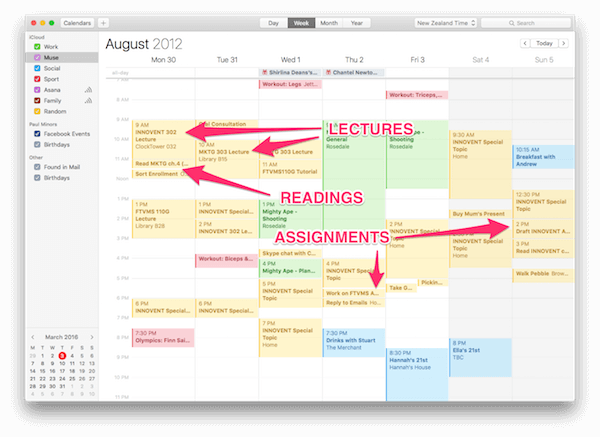I remember when I was at University how pressed for time I was. Balancing multiple projects, assignments and other commitment's can be tough. But don't worry, I'm here to help.
In fact, it was back when I was studying that I began my journey into productivity. Here's a very simple approach I used to organise my time so that I could get all my assignments completed on time:
Step one: Be aware of all your deadlines
Usually, at the start of the semester, the lecturer will go through the course plan and tell you when all the tests and assignments have been scheduled for. The first thing you want to do is jot down all the dues dates for the assignments you have for each class.
You can do this in a task management app like Asana or ToDoist. I suggest having one project for each class or paper that you're taking.
Step two: Deconstruct each assignment
Write down all the steps you need to complete to finish each assignment. For example, if you're writing an essay you need to:
- Do some research.
- Plan the essay.
- Write the introduction.
- Write paragraph 1.
- Write paragraph 2.
- and so on….
- Write the conclusion.
- Review and rework the essay.
- Write the final draft.
- Proofread for mistakes.
- Hand in for grading.
Other types of assignments will have different steps. Go through a similar process to list everything you need to do to complete the assignment.
Step three: Working backwards, schedule time to work on each of these steps
If you need to hand in the assignment on the 20th of June, then you'll want to proofread at least a day or two before this. You'll want to write the final draft a few days before this, and you'll want to edit and rework the essay maybe a week before this…
For each task, schedule a block of time in your calendar to complete the work. Make sure you are realistic with the amount of time you need to do the work.

TIP: Make sure you've already scheduled all your classes so you know when everything is happening and appointments don't clash.
As you work backwards you'll be able to work out the date you need to start the work by in order to finish the assignment on time (assuming you stick to the plan). The advantage of scheduling your time like this is that you're making a commitment to yourself that you're going to do a specific piece of the work at a particular time. You know that if you delay your plan will be thrown off. As a consequence, you become less impulsive and are less likely to procrastinate.
